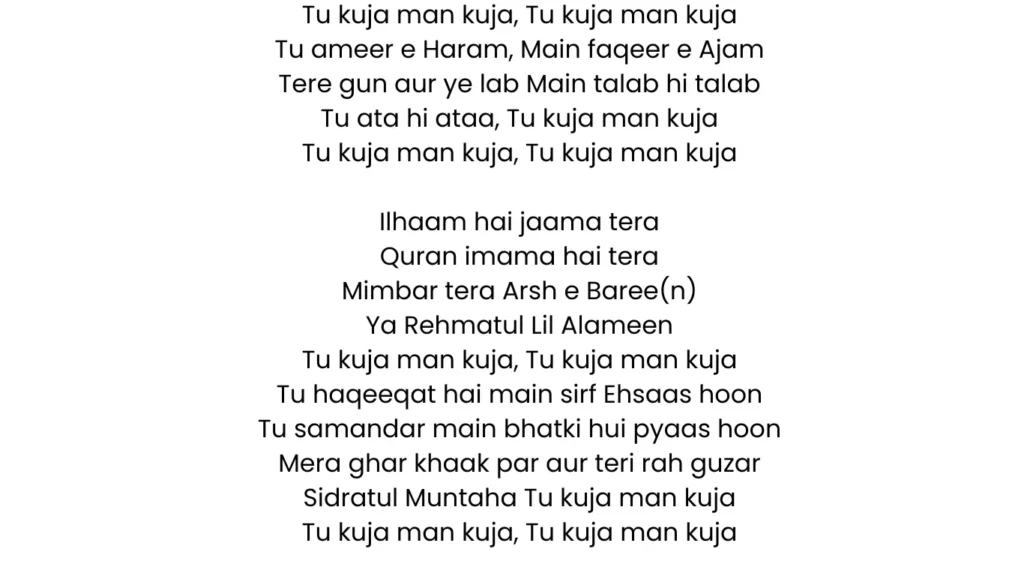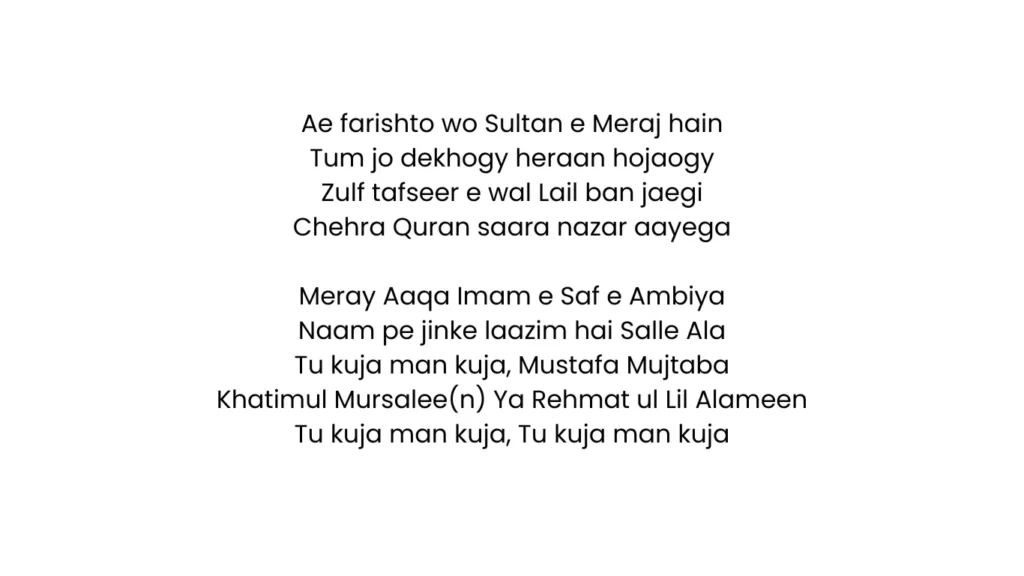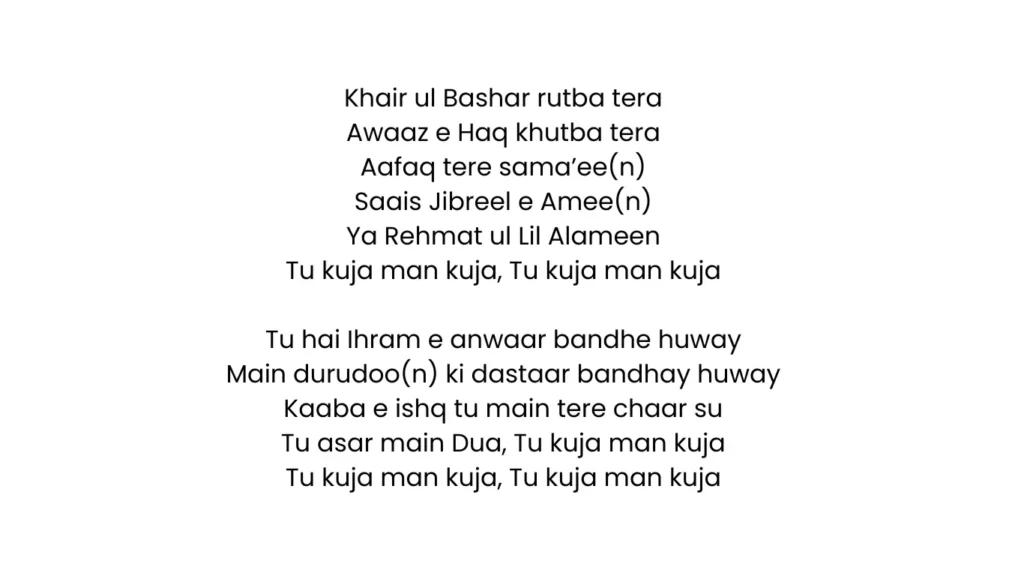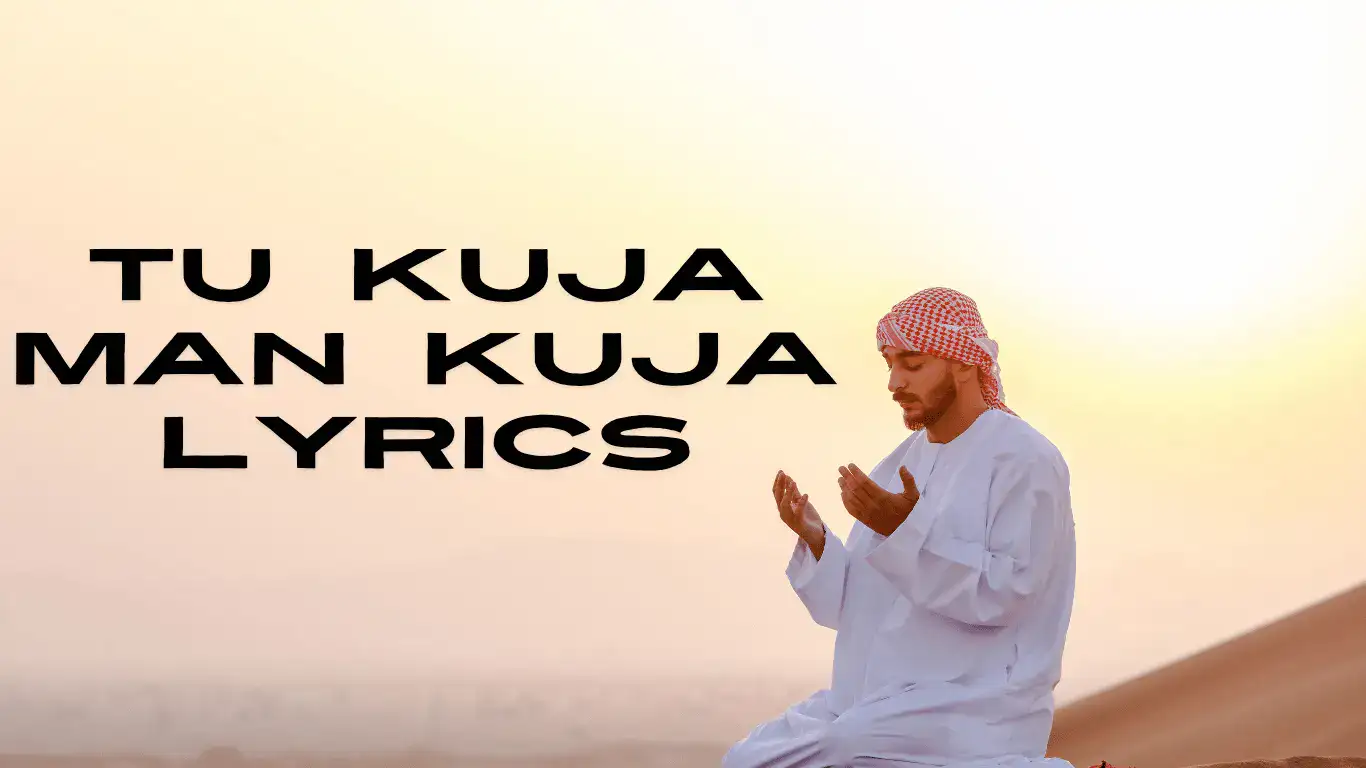The qawwali Tu Kuja Man Kuja is a heartfelt ode of humility and reverence, performed by various artists over time, including Ustad Nusrat Fateh Ali Khan. Its lyrics poetically depict the vast difference between the Creator or His beloved Prophet Muhammad (PBUH) and the supplicant. Each verse is a reflection of love, submission, and admiration, resonating deeply with anyone seeking spiritual connection.
In this article, we will break down the “Tu Kuja Man Kuja Lyrics” verse by verse, exploring their meaning, significance, and how they inspire devotion.
| Chamak Tujhse Paate Hain Lyrics |
| Ik Khawab Sunawan Lyrics | اک خواب سݨاواں |
| Shahe Madina Naat Lyrics |
| Muhammad ka Roza Lyrics | محمد کا روزہ |
Verse-by-Verse Analysis
1. Tu Kuja Man Kuja
“Tu Kuja Man Kuja, Tu Kuja Man Kuja
Tu Ameer-e-Haram, Main Faqeer-e-Ajam
Tere Gun Aur Ye Lab, Main Talab Hi Talab
Tu Ata Hi Ata, Tu Kuja Man Kuja.”
Translation:
“You are exalted, the Leader of the Sacred Mosque, and I am a lowly beggar of Ajam.
Your virtues fill the heavens, while I am a seeker with endless desires.
You bestow generously; You are where, and I am where.”
This verse captures the essence of humility, emphasizing the unbridgeable gap between the Creator’s majesty and the human being’s insignificance. It acknowledges the boundless generosity of Allah and the endless needs of His servant, setting the tone for the qawwali’s theme of submission and gratitude.
2. The Divinity of Revelation
“Ilhaam Hai Jaama Tera
Quran Imama Hai Tera
Mimbar Tera Arsh-e-Baree(n)
Ya Rehmatul Lil Alameen.”
Translation:
“Revelation is your robe, the Quran your guide.
Your pulpit is the Divine Throne.
O Mercy to the Worlds (Ya Rehmatul Lil Alameen).”
This verse glorifies Prophet Muhammad (PBUH) as the bearer of divine revelation and the guide of humanity. It illustrates the elevated status of the Prophet as the leader of all creation, referred to here as Rehmatul Lil Alameen (Mercy to the Worlds).
3. The Longing of the Supplicant
“Tu Haqeeqat Hai Main Sirf Ehsas Hoon
Tu Samandar Main Bhatki Hui Pyaas Hoon
Mera Ghar Khaak Par Aur Teri Rah Guzar
Sidratul Muntaha Tu Kuja Man Kuja.”
Translation:
“You are the ultimate reality, and I am merely a feeling.
You are the ocean, and I am a wandering thirst.
My dwelling is dust, and your path reaches the Sidrat-ul-Muntaha (the furthest boundary).”
This verse speaks to the vastness of Allah’s grandeur and the limited understanding of the human being. The reference to Sidrat-ul-Muntaha, the boundary of divine knowledge, highlights the immense spiritual elevation of Allah and His Messenger.
4. The Majesty of the Prophet
“Ae Farishto Wo Sultan-e-Meraj Hain
Tum Jo Dekhogy Heran Hojaogy
Zulf Tafseer-e-Wal Lail Ban Jaegi
Chehra Quran Saara Nazar Aayega.”
Translation:
“O angels, He is the Sultan of the Night Journey (Miraj).
When you witness his glory, you will be amazed.
His locks of hair embody the Tafsir of Wal-Lail (the night),
And his face reflects the Quran entirely.”
This verse beautifully describes the exalted status of the Prophet Muhammad (PBUH), especially during the Miraj (the Night Journey). It poetically associates his physical attributes with divine revelation, portraying him as a living embodiment of the Quran.
5. The Pinnacle of Prophethood
“Mere Aaqa Imam-e-Saf-e-Ambiya
Naam Pe Jinke Laazim Hai Salle Ala
Tu Kuja Man Kuja, Mustafa Mujtaba
Khatimul Mursaleen, Ya Rehmatul Lil Alameen.”
Translation:
“My Master, the Leader of the Prophets.
Upon whose name blessings are obligatory (Salle Ala).
You are where, and I am where, O the Chosen One, the Seal of the Prophets.
O Mercy to the Worlds (Ya Rehmatul Lil Alameen).”
This verse glorifies the Prophet as the Imam-e-Saf-e-Ambiya (Leader of the Prophets) and Khatimul Mursaleen (Seal of the Prophets). The repeated phrase “Tu Kuja Man Kuja” expresses awe at his greatness.
6. The Ultimate Submission
“Tu Hai Ihram-e-Anwaar Bandhe Huway
Main Durudoon Ki Dastaar Bandhe Huway
Kaaba-e-Ishq Tu Main Tere Chaar Su
Tu Asar Main Dua, Tu Kuja Man Kuja.”
Translation:
“You are adorned with the robe of divine light,
While I am adorned with the crown of blessings upon you.
You are the Kaaba of love, and I am around you.
You are the effect, and I am the prayer. You are where, and I am where.”
This verse portrays a worshipper’s devotion to the Prophet and Allah. It emphasizes that Allah and His Messenger are central to a believer’s spiritual existence.
Themes of “Tu Kuja Man Kuja”
- Humility: Acknowledging one’s insignificance before Allah and His Prophet.
- Divine Love: Expressing an eternal bond of love with the Creator and His Messenger.
- Spiritual Aspiration: Highlighting the believer’s longing to draw closer to Allah despite the vast gulf.
- Reverence for the Prophet: Glorifying the Prophet Muhammad (PBUH) as the leader of all humanity.
Tu kuja man kuja lyrics in Roman urdu



FAQs:
The phrase Tu Kuja Man Kuja means “You are where, and I am where,” expressing humility and the infinite gap between the divine and human.
This qawwali has roots in Islamic poetry and was immortalized by Ustad Nusrat Fateh Ali Khan through his iconic rendition.
The main theme is the believer’s humility and awe in the presence of Allah and His beloved Prophet Muhammad (PBUH), expressed through poetic devotion.
Conclusion
“Tu Kuja Man Kuja” is more than just a qawwali; it is a deeply spiritual experience that resonates with hearts yearning for divine connection. Each verse is a poetic masterpiece that reflects love, devotion, and humility toward Allah and His Messenger. By understanding and internalizing its message, listeners can embark on a journey of spiritual awakening and eternal gratitude.
Let this qawwali remind us of our place in the grand scheme of creation and inspire us to seek closeness to the divine through love and submission.




